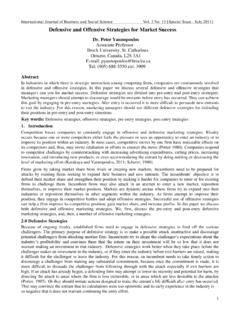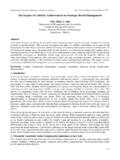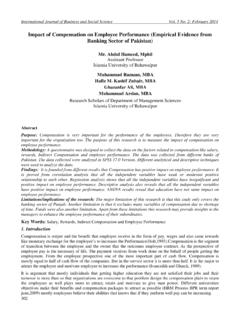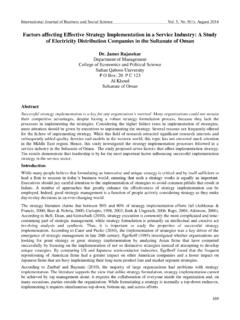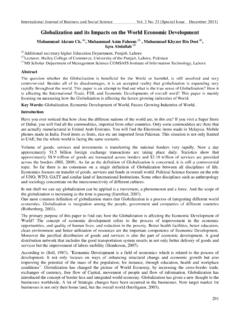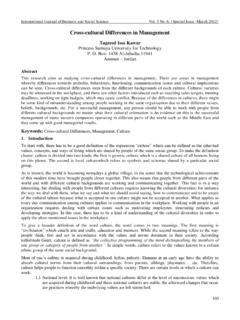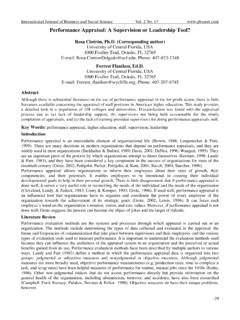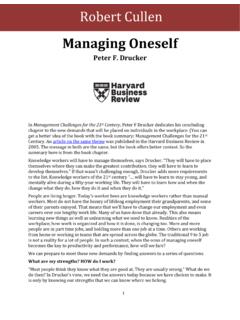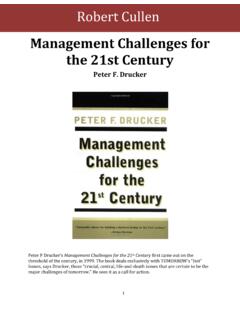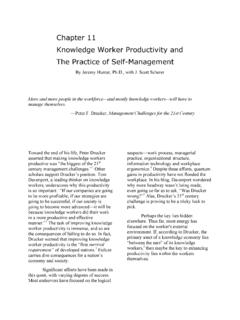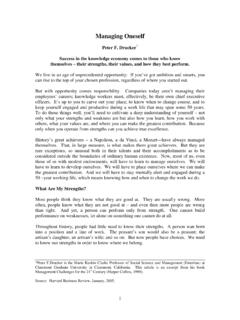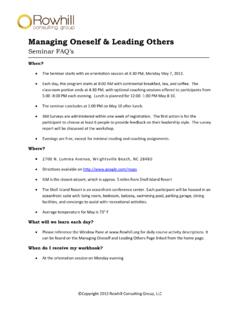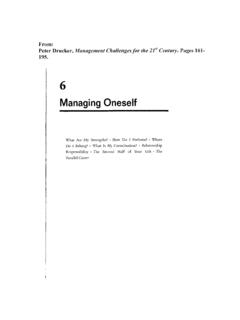Transcription of The Conceptual Framework of Entrepreneur and Self …
1 International Journal of Business and Social Science Vol. 2 No. 20; November 2011 180 The Conceptual Framework of Entrepreneur and Self Management Esuh Ossai-Igwe Lucky, PhD College of Business Universiti Utara Malaysia Malaysia Mohd Sobri Minai, PhD College of Business Universiti Utara Malaysia Malaysia Abstract Until now, many entrepreneurs remain ineffective as a result of their inability to manage themselves, which is critical for the entrepreneurs personal success and firm performance. Self management has not been explored in both academic and practical field of small business and entrepreneurship discipline.
2 Research in this area has only been focusing on entrepreneurship and time management. This paper is motivated to discuss self management in relation to Entrepreneur and small business performance. The paper argues on the crucial role of self management for entrepreneurs success and firm performance. It highlights that self management deserves urgent and serious attention in entrepreneurial discourse and should not be neglected. It also provides the way forward to examine self management in relation to entrepreneurs and their business performance. Keywords: Self Management, Management, Entrepreneurship, Performance 1.
3 INTRODUCTION There is no doubt that management remains one of the crucial factors that assists entrepreneurs to achieve great success in their business and entrepreneurial activities. Management has helped managers as well as the entrepreneurs or owner-managers to effectively plan, organise, coordinate, and control their business and entrepreneurial activities (Othman, 2010). This reflects that the importance of self management cannot be undermined. For instance, Bennett (2007) noted that self management techniques would assist an Entrepreneur to become a more successful and effective Entrepreneur . Similarly, self management assists entrepreneurs to minimise business and personal stress and stay motivated in their business and entrepreneurial endeavours.
4 Thus, it is theorised that an Entrepreneur that thinks and emphasises on self management has high potential to achieve business success. This also indicates the reason why many have argued on the high interest among academia and practitioners on small business and entrepreneurial management disciplines over the past years (Greening, Barringer and Macy, 1996). Several aspects of management have been introduced lately. Notably among these management aspects are the human resource management, operations management or production management, strategic management, marketing management, financial management, information technology management, the context of entrepreneurship management, it can be observed that the studies on entrepreneurship management are abundant, however, the important issue of how Entrepreneur manages himself has been greatly neglected.
5 In fact, it can be claimed that it lacks attention by both the entrepreneurs and the academics. This is a gap that this paper intends to bridge. For instance, in knowing how the entrepreneurs give attention to the right way of managing their businesses. It is important to recognize that the entrepreneurs carry out many functions such as planning, organising, coordination and controlling. managing all these functions by a single person is not an easy task. Those who can manage all these functions effectively pave way to business glory and those who fail face business failure. Akintola (2011) has highlighted that those entrepreneurs remain ineffective as a result of their inability to manage themselves as part of the overall management.
6 This provides possible explanation on the reasons of high failure rate of small firms in the first few years of establishment (Adelakun, 2010). For Othman (2010), the entrepreneurs are very much concerned about how to manage their businesses and firms, forgetting that an affective self management would lead to entrepreneurs effectiveness and in turn translate into effective business performance. It is argued here that an effective entrepreneurs self management contributes to his personal effectiveness and consequently leads to a better firm performance. Within the context of this discussion, self management is defined as the application of the four key functions of management into managing oneself .
7 Centre for Promoting Ideas, USA 181 It is any methods, skills, and strategies that assist the entrepreneurs with the opportunity to effectively plan, organize, coordinate and control themselves towards attaining both his personal and business goals. The applicability of these management functions into him refers to self management. Thus, self management requires entrepreneurs not only to manage his/her business or firm but also to manage his/her self as a person in order to be more effective in person as well as to his firm or business.
8 Whilst the paper intends to provide a foundation for future research that would solely look into entrepreneurs self management, it aims to engage in the discussion on the Conceptual discourse on how entrepreneurs self management could lead to personal effectiveness leading toward desired firm performance. Thus, this paper would be beneficial to entrepreneurs /business owners and would contribute to the entrepreneurship development literature as well. LITERATURE REVIEW Self Management The concept of management could be seen virtually in all aspect of human activities including that in animals and plants. However, it is more often related to management of business and organization activities and by this, it involves the process of getting things done through people in order to attain a stated goal and objective.
9 Therefore, management could be said to be the effective and efficient way to accomplish a stated objective through people. It involves the use of management tools such as planning, organizing, staffing, directing and controlling of both the organizational activities and the people in the organization. Meanwhile, others have view management as any human act or activity which consists of design that would assist the creation of fruitful results from the system. Management is equally defined as the process and act of planning, organising, coordinating and controlling of people in order to achieve or attain the organisational goals (Othman, 2010).
10 Management has become imperative and crucial whenever there are two or more people working together to achieve a common goal. Therefore, management is an event that brings two or more people together and then creates a relationship between a leader and a follower or a manager and subordinate where the leader or the manager can apply the four essential functions of management (planning, organising, coordinating and controlling) in a bid directed to the organisational goal. Several aspect of management exists most especially in 21st century literature on management. Notable among these management aspects include; human resource management, operations management or production management, strategic management, marketing management, financial management, information technology management etc.

